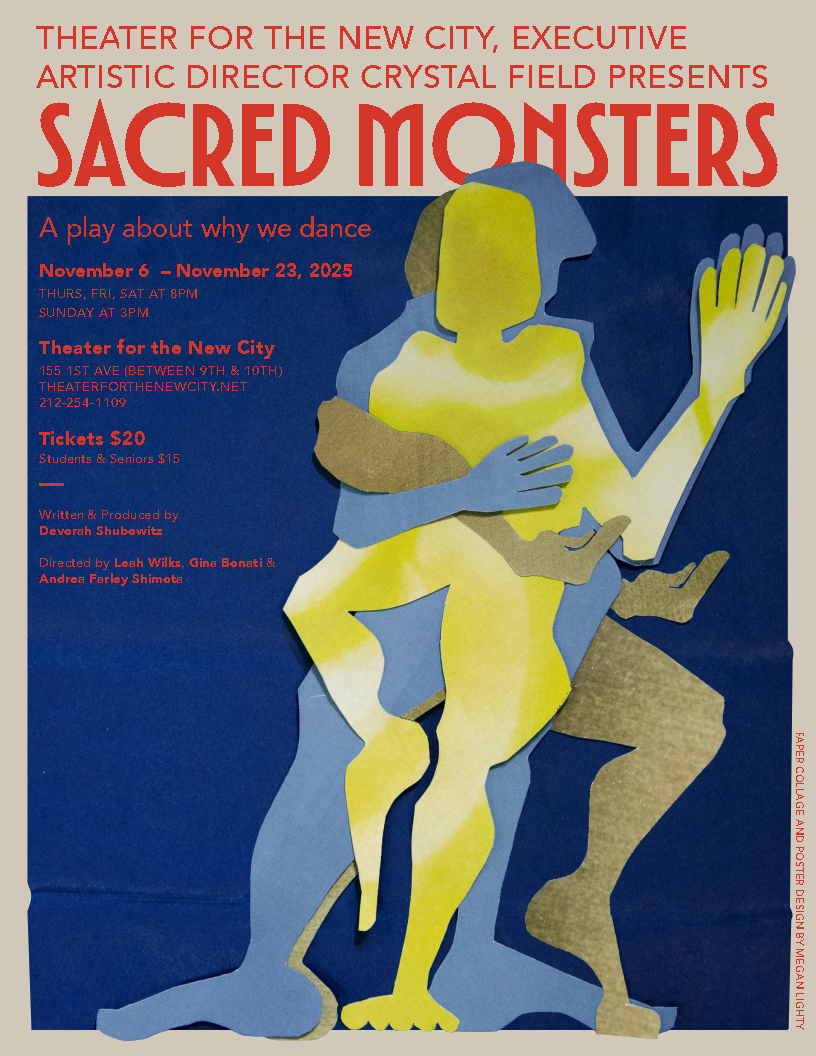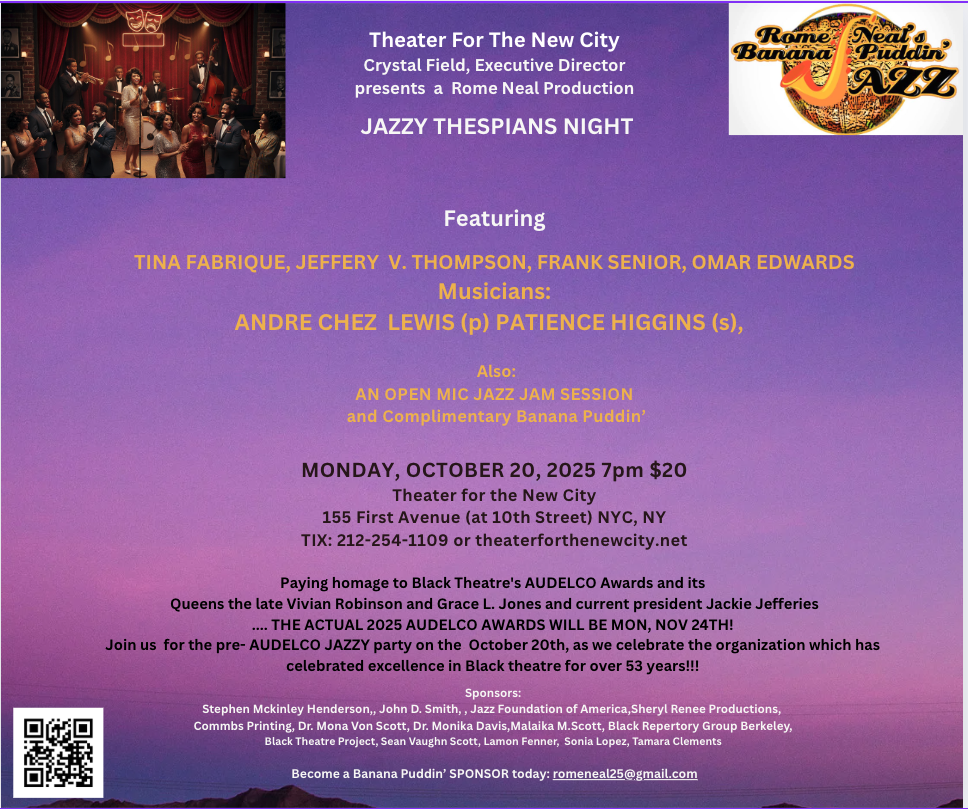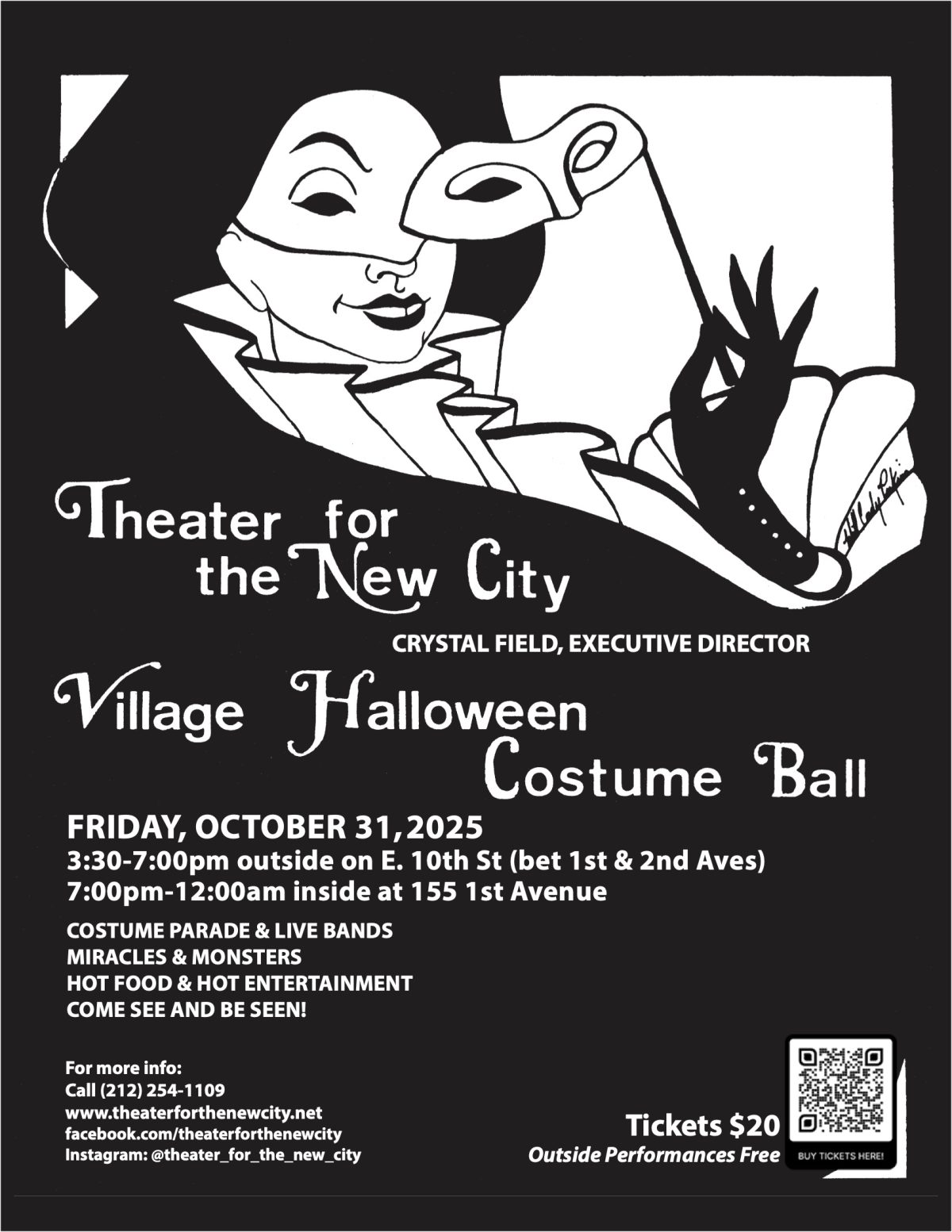THEATER FOR THE NEW CITY
Executive Director, Crystal Field
Presents
AUGUST STRINDBERG REP IN
THE WORLD PREMIERE OF A NEWLY TRANSLATED PLAY BY AUGUST STRINDBERG
First Warning!
a comedy, translated and directed by Robert Greer
October 2 – October 12, 2025
Thursday, Friday, Saturday at 8:00 PM, Sunday at 3:00 PM
Tickets $18, Students & Seniors $15
Run Time: 45 minutes
CINO THEATER
THEATER FOR THE NEW CITY
155 First Avenue (between 9th and 10th Street)
New York, NY 10003
Directions
Theater for the New City will present August Strindberg Rep in the English-language premiere of Strindberg’s little-known “First Warning” (1892), translated and directed by Robert Greer. The play, Strindberg’s only comedy, explores his fascination with love, jealousy, and the battle of the sexes through a farcical exploration of a stormy marital quarrel.
“First Warning,” a semi-autobiographical marital comedy, has never before been produced in English. It offers audiences a glimpse of Strindberg as a provocateur, challenging morality and social convention, and as a craftsman experimenting with new theatrical forms. It offers a surprising glimpse of Strindberg in a lighter, satirical mood. Known worldwide for the searing naturalism of “Miss Julie” and “The Father,” Strindberg here turns his attention to the follies of marriage, jealousy, and vanity with a comic touch.

In the play, Axel and Olga have been married for fifteen stormy years. For a winter holiday, they have rented rooms in a house in Germany owned by a baroness and her bratty young daughter, Rosa. Axel–tormented by jealousy–resolves for the umpteenth time to leave Olga. Amid a few rounds of arguments and confessions during his packing, she softens toward him, especially after the offer of a great gift is revealed in the second half of the play.
Strindberg subtitled the play “A Comedy.” It centered on Axel’s jealousy toward his much younger wife, her friends, and the gossip surrounding them. Instead of spiraling into murder or despair (as in “The Father”), the situation resolves with irony and reconciliation. The object of the “warning” is Axel’s vanity and insecurity, with Strindberg commenting on generational differences in marriage, the male ego and bourgeois morality. The irksome, nettling young Rosa often serves as the voice of insight and warning in the comedy. She observes the tensions, betrayals, and hidden resentments of the adults around her and interprets them for the audience. Thus she embodies the “warning” of the play’s title: that the sins and failures of parents will resonate in the lives of their children. Strindberg tells us that the children can do something about it.
As a parody of contemporary artistic forms and late Victorian mores, “First Warning” is oddly parallel to “The Importance of Being Earnest.” The two plays premiered the same year at a time when the world first began to appreciate a woman’s possible enjoyment of sexual delight.
PRODUCTION HISTORY OF “FIRST WARNING”
The play relates an actual incident from Strindberg’s first marriage, to which he makes reference in his novel “A Fool’s Confession” (written between 1887 and 1888). Originally titled “Första varningen” in Swedish, it had its world premiere at Residenztheater, Berlin, January 22, 1893, where it was a huge success. It had been accepted but never performed at Sweden’s Royal Theatre (Dramaten) in 1892. The actors boycotted the play after the first reading because they found Rosa’s role immoral. Reviewers thought the same when the play was published by Bonniers in the collection Dramatik in 1893. They were shocked by the erotically experienced and open-hearted Rosa. The play premiered at the Residenztheater in Berlin, on January 22, 1893, under the title “Herbstzeichen” (Signs of Autumn). It was printed in both Germany and Sweden that same year.
In Svenska Dagbladet, Hjalmar Sandberg wrote that Rosa was a peculiar role, that her approachability became comical, but also that she seemed too daring yet childish for the stage of development “represented by her nineteen years.” Gustav Fröding expressed a different opinion in Karlstads-Tidningen, describing Rosa as “an eccentric, pompous youngster, portrayed with admirable certainty and truth.”
There was a Swedish premiere tour with Julia Håkansson/Olof Hillberg in 1907. When Första varningen was finally staged, it was at Strindberg’s Intima Teatern in Stockholm on September 14, 1910. By now Strindberg was a renowned playwright. Several reviewers were as fascinated by Rosa as Fröding had been seventeen years earlier.
In 1913, “Första varningen” was staged again at the Intima Teatern as a prelude to Strindberg’s “Creditors.” Interest was also drawn in this production to the role of “the teenage Rosa, whose precocious love life is laid out for dissection.” (G.B., Svenska Dagbladet) In 1948, “Första varningen” was staged together with Strindberg’s “Mother Love” on Radio Theatre. The reviewer in Stockholms Tidning was impressed. Maj-Britt Nilsson played Rosa “ruthlessly and juicy.” There was nothing left of the 1890s ingenue, which was completely dated in 1948. Ingemar Bergman was in charge of the direction. Radio Theatre reprised “The First Warning” in 1960, again under Bergman’s direction with Gunnar Björnstrand and Eva Dahlbeck in the lead roles.
Research by Robert Greer has detected no previous English language production of this play. His adaptation sets the play in Switzerland in 1953. He writes, “The play has a once-upon-a-time quality and its characters that of a comic fairytale, reminiscent of an elaborate Swiss clock.”
CAST
Natalie Menna plays Olga
Mike Roche plays Axel
Holly O’Brien plays Rosa
Anne Stockton plays the Baroness
PRODUCTION
Lighting design is by Alexander Bartenieff
Costume design is by Billy Little
Stage Manager is Jose Ruiz
Natalie Menna has appeared at TNC in lead roles in six Strindberg Rep productions: Julie in “Miss Julie,” Hedda in “Hedda Gabler,” Elise in “Pelican/Isle of the Dead,” Laura in “The Father,” Tekla in “Creditors” and Alice in “Dance of Death, Parts 1 & 2,” all in new translations by Robert Greer. Last season at TNC, she played Vivien Leigh in “Orson’s Shadow,” written and directed by Austin Pendleton. She is also a playwright; TNC has presented her plays “Hiroshi Me-Me-Me,” “Zen A.M.” and “Occasionally Nothing.” (www.NatalieMenna.com)
Mike Roche has appeared at TNC in Strindberg Rep productions of Miss Julie” (as Jean), “Hedda Gabler ” (as Judge Brack) and “Creditors” (as Gustav). Other credits include “Occasionally Nothing” by Natalie Menna (TNC), “The Hook” by Arthur Miller (American premiere at Brave New World Rep), “Night Over Taos” (INTAR, dir. Estelle Parsons), and “Billy the Kid” (Flea Theatre, dir. Jim Simpson). He is a member of Godlight Theatre Company (2010 Drama Desk Award). (www.MikeRoche.net)
Holly O’Brien has appeared at TNC in Strindberg Rep productions of “Miss Julie” (as Christine, the cook), “Hiroshi-Me, Me, Me” and “Occasionally Nothing” by Natalie Menna. She played Belle in “Disney’s Beauty and the Beast” and Goldie in “Two By Two,” directed by Martin Charnin. Other regional credits include “Norma Jean Enlightened,” “The Teffetas,” “The Marvelous Wonderettes,” “The Iceman Cometh,” “The Fantastiks” and “Noises Off.” She sang Glinda in a “Wicked” Broadway concert with the Rockland County Choral Society. (www.HollyEOBrien.com)
Anne Stockton has written and performed two solo shows that were directed by Austin Pendleton “The Speed Queen” (based on the novel of the same name by Stewart O’Nan) was performed at NJ Rep, United Solo Festival and Midtown International Theater Festival (Outstanding Performance in a Solo Show). “I Won’t Be In On Monday” was presented at Off the Wall Theater and United Solo Festival (Best One-Woman Drama). She has appeared OOB at HERE, Playwrights Horizons and Cubiculo among others, and has appeared on-camera in CBS’s “Blue Bloods” (co-star) and the films “Silent Partner” (co-star) and “But” (lead), among others. In her “day job,” she is an MD/Psychiatrist and has been an actor/trainer for the NYPD Hostage Negotiation Team and Emergency Service Unit.
Robert Greer (translator/director) is Artistic Director of August Strindberg Rep, which is a resident company of TNC. He has staged twenty Strindberg productions with the company to-date as well as English-language premières of contemporary Scandinavian playwrights, including Denmark’s Stig Dalager; Sweden’s Kristina Lugn, Marianne Goldman, Helena Sigander, Cecilia Sidenbladh, Hans Hederberg, Oravsky and Larsen, and Margareta Garpe; and Norway’s Edvard Rønning. He has also directed classics by Henrik Ibsen, Victoria Benedictsson, Laura Kieler, Anne Charlotte Leffler, and Amalie Skram. His productions have been presented at the Strindberg Museum and Strindberg Festival, Stockholm; Edinburgh and NY Fringe Festivals; Barnard College, Columbia University, Rutgers, and UCLA; Miranda, Pulse and Theater Row Theaters, La MaMa, Manhattan Theatre Source, Tribeca Lab, Synchronicity, TSI, and BargeMusic in NY; and The Duplex in LA. He has directed plays by Mario Fratti, Sartre and Corneille here in New York. He is a member of SDC, AEA and Swedish Translators in North America.
August Strindberg Repertory Theatre, under the direction of Robert Greer, is committed to productions of Nordic plays in new translations and interpretations that illuminate the works for today’s American audience. That is why TNC has taken this repertory into its family. Mr. Greer writes, “Strindberg Rep is deeply grateful to Crystal Field for having made us a resident company. Ms. Field’s support of new plays (and plays newly translated) has been a godsend to us. Her knowledge and experience of theater is a beacon guiding us and her unflagging devotion to the art of the drama and its artists is a role model for leaders of all cultural institutions.” (https://Strindbergrep.com)














